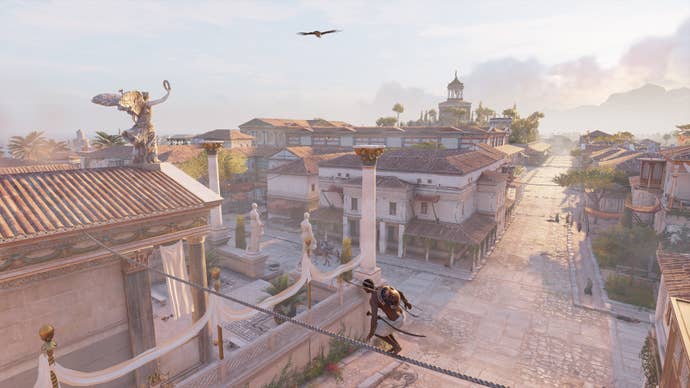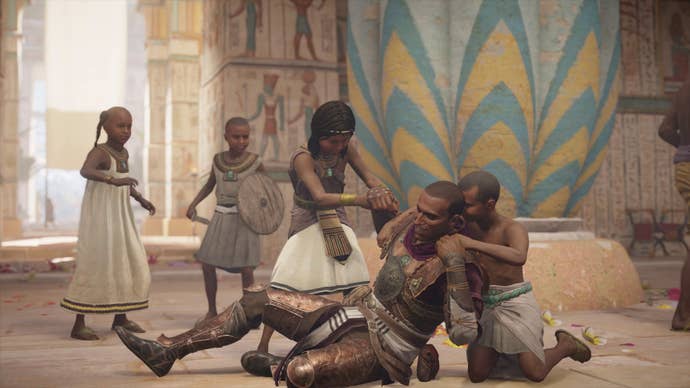How Assassin's Creed Origins Captures the Politics, Colonialism, and Betrayal of the Real Ancient Egypt
Assassin's Creed Origins goes where no Assassin's Creed game has gone before: tracing the abuses of power, from Ancient Egypt to modern times.
This article first appeared on USgamer, a partner publication of VG247. Some content, such as this article, has been migrated to VG247 for posterity after USgamer's closure - but it has not been edited or further vetted by the VG247 team.
Spoiler Warning: Caution, this article contains spoilers for both Assassin's Creed Origins and, uh, history. But you paid attention in history class, right?

There is the sense of apocalypse—of something monumental coming to an end—in Assassin's Creed Origins. Set during the late 40s BCE, Ubisoft Montreal's latest follows Bayek of Siwa, a man from late period Ptolemaic Egypt, on a quest to find the shadowy Order of Ancients responsible for the death of his young son. Described anachronistically as a medjay (that job hadn't existed in Egypt for about a millennium before the game starts), Bayek travels the expanse of Lower Egypt. He picks through tombs and climbs pyramids, slitting throats and running errands in the deserts of Siwa and Giza or the bustling cities of Alexandria and Memphis.
Despite its name, Origins is very much about the end of an era. As players explore a virtual recreation of the Egyptian landscape, they encounter poor farmers seeking the death of ruthless tax collectors, an ailing Apis Bull that portends doom, ethnic divides fracturing Greek and native communities, and, constantly, curses directed at the name of Ptolemy XIII, the co-ruler of the land who has forced his wife (and older sister), Cleopatra VII into exile. Though the pyramids and the Great Sphinx still stand, Egypt, it seems, is dying.
It seems like a strange choice of setting for a game meant to portray, at least in part, the grandeur of Ancient Egypt. Even though Origins doesn't do a great job explaining the background of its time period, its vision of a Pharaonic Egypt barreling toward extinction proves to be a fantastic setting, both as a way into the very real history of our world and as a means of exploring the long-running series' interest in a conspiracy-laden reinterpretation of the past.

The Assassin's Creed games have always been impressively researched, their settings impeccably detailed and filled with historical trivia. But, aside from several of its early entries, it's had little to say about the eras it takes place within. While past games may have featured sci-fi time travellers inhabiting the bodies of ancestors who fistfight Pope Alexander VI as he monologues on a century-spanning plot for world domination, they've also stayed true to the broad details of history. At their best, as in the unfairly maligned Assassin's Creed III, a period like the American Revolution can be retold as not just a fevered story of secret societies and extraterrestrial gods, but as an impactful look at the birth of a country whose population, native and immigrant alike, must struggle to find their place in a grand political experiment.
More recently though, the series has shied from offering substantive interpretations of history. A game like Origins' predecessor Assassin's Creed Syndicate lovingly recreates the architecture and events of 1868 Victorian London, but trots out its most famous citizens—like the Queen herself, the monarch who presided over the height of the British Empire—as nothing more than celebrity cameos, divorced from any real commentary on why they matter to global history.
Origins welcomingly departs from this trend. In diving further into the past than any other entry to the series and finding in its examination of a long since vanished way of life, Origins instead has prescient insight into our modern world.
The End of an Era
By the time Origins begins, Egypt is a kingdom divided. Centuries before the era in which it takes place, Alexander the Great had conquered Egypt, defeating its previous Persian ruler Darius III and installing his childhood friend and general, Ptolemy I Soter as satrap (also known as governor). Alexander died soon afterward, and Ptolemy would become the first Ptolemaic pharaoh (or king), beginning a new Greek dynasty. Egypt had been ruled by foreign powers before and managed to hold onto its cultural, social, and religious traditions. But many factors in this era—poor leadership by Ptolemy’s successors chief among them—would spell the end of a three thousand year-old kingdom.
Origins takes place during the final years of the Ptolemaic Dynasty. Cleopatra has just returned from exile and a civil war that will pit her supporters against those of her brother, husband, and co-ruler Ptolemy XIII is approaching. The powerful Roman Empire, now deeply involved in Egyptian politics, looms over everything. Its favor (or lack thereof) could tip the scales in any direction.

Perhaps more important than the fate of empires, though, is life for ordinary Egyptian citizens during Cleopatra VII and Ptolemy XIII’s reign. The Kingdom's sovereignty was slipping away, but for average laborers a lot else had already been lost in the centuries since Alexander's conquest. Though measures were taken to ensure true equality among native and immigrant populations, Egyptologist Toby Wilkinson, in his comprehensive history The Rise and Fall of Ancient Egypt, describes a "...cultural and ethnic divide between the Greek cities and the Egyptian countryside [that] ran like a fault line through Ptolemaic society."
While life had never been easy for Egyptian peasants during previous eras, the new dynasty saw even greater difficulties introduced. "A small class of Greek officials, merchants, and soldiers ruled the roost, while the mass of Egyptian peasantry tilled the fields, as they had always done," Wilkinson writes. "Like colonial rulers before and since, the Ptolemies were concerned with squeezing every drop of profit out of their territory, regardless of the consequences."
Before Cleopatra VII took the throne, previous Ptolemaic pharaohs had been forced to contend with rebellions that resulted from their misrule. Dynastic squabbles between incestuous royal families weakened the stability of the Ptolemies’ leadership. The division of society along lines of class and ethnicity inspired revolts. Threatened by aggressive foreign empires, weak internally and externally, Egypt grew closer to Rome who, rather than annex the less powerful land, settled for accepting lavish payments. The once great Egyptian Kingdom was fading under a corrupt dynasty and unevenly divided society.
A clear example of Egypt’s decline comes from Wilkinson’s description of Ptolemy XII. The pharaoh preceding Cleopatra VII and Ptolemy XIII had been driven into exile by Alexandrian mobs furious about an exorbitant sum he had paid Rome. While forced out of his kingdom, Ptolemy begged for help from the Romans and was pitifully granted an audience, at last, with Marcus Porcius Cato. He was admitted to see Cato "while the latter was on the toilet after a particularly effective dose of laxative." The days of the mighty and proud Pharaohs were at an end.
A Fictional History
The fragility of Egypt's future isn't explicitly detailed in Origins, but it comes across in context. Telling examples of the Kingdom's decay are everywhere. Bayek acts as bodyguard to a Greek woman who all but holds her nose as she's escorted through Alexandria's Egyptian district, poorer than the neighborhoods she's used to. He helps solve problems related to the excessive taxes that leave native farmers destitute and starving. Just about every side mission involves, in some way, the misery of a people trapped in a corrupt system and a dying way of life.

Though the game world is beautiful, encompassing everything from the tomb and pyramid-studded sands of Giza to the imposing temples of the major cities, there's a sadness to it that comes from the constant reminder that these architectural wonders are already becoming relics of a disappearing time. Rather than set the game during, say, the imperial heights of Ramesses II's 13th century BCE reign, Origins takes place after the glory days of Pharaonic Egypt had passed. It's a sign that unlike other recent Assassin's Creed games, the game has something to say about the historical era its creators have so painstakingly recreated.
The existence of a great kingdom so culturally, economically, and politically rich, fading away is a solid choice of background for a game about the nature of authoritarian power—always the series' favorite theme. Setting its action in the last years of the Ptolemaic Dynasty allows for commentary on the endless cycles of abusive political structures, using nothing less than the fall of one of the ancient world's longest-lived, most influential kingdoms/empires as illustration.
Aside from the larger motions of the plot, Origins' protagonist, like other heroes from past entries to the series, also functions as a kind of avatar for the historical time and place he inhabits. Elements from his story arc provide thematic shorthand for the era. Most immediately is where Bayek comes from: the Siwa Oasis in the Sahara. It was there, in 332, that Alexander the Great visited the Oracle of Amun alongside Ptolemy I after liberating Egypt from Persian rule. The Oracle, as the story goes, told Alexander that he was a divine son of Amun (an Egyptian god the Greeks would identify with Zeus) and, accordingly, a legitimate Pharaoh. From this point on, the bedrock of the Ptolemaic Dynasty was established. In many ways, Siwa was the beginning of the end for Pharaonic Egypt.
Siwa is also where Bayek and his wife Aya's son is killed by the mysterious Order of Ancients—an early version of the series' later villains, the domineering Templar Order. Murdering the Egyptian child doesn’t just set the plot in motion. It also signals, right from Origins' beginning, that the future of a long held way of life is coming to an end. The next generation, represented by Bayek and Aya's son, dies at the same place where the final phase of Pharaonic Egypt began.
Freedom Versus Authority
Origins' ending follows through on its opening hours' promise. After dozens of hours spent murdering members of the Order of Ancients and helping tend to the social and economic problems plaguing the people of Lower Egypt, Aya and Bayek are betrayed by Cleopatra and Gaius Julius Caesar. Her victory over Ptolemy XIII secured, the final acts of Origins follow Cleopatra's union with Julius Caesar. Discovering the architect of the plot that killed their son is protected from punishment on the basis of being Roman, the enraged Aya announces that she and Bayek's allies throughout the game are forming a new freedom-fighting group to stop any politician or government that abuses their power. The first mission of the newly formed Brotherhood of Assassins involves Aya travelling to Rome, with Marcus Junius Brutus and Gaius Cassius Longinus, to coordinate the murder of the newly proclaimed "dictator in perpetuity," Caesar.

Once again, Origins leaves out the greater implications of its ending, assuming that players already know the repercussions of Caesar and Cleopatra's alliance and what the former's death meant for Egypt. In brief, Cleopatra's Rome-assisted victory over Ptolemy XIII would have very little positive impact for Egypt's long-term prospects. The Kingdom was now inextricably dependent on the whims of Roman leaders for its existence. As Wilkinson puts it, "Cleopatra had won, but Egypt had lost." Foreign soldiers now occupied the land and Caesar's death would leave Cleopatra scrambling for new favor in Rome. Once again, she would tie herself to the most promising candidate: Marcus Antonius or Marc Antony. As with Caesar, Antony's defeat in a Roman power struggle would leave Egypt vulnerable.
Following the end of Antony's war with Octavian (born Gaius Octavius, later Emperor Augustus), Cleopatra—and Egypt—were left at the mercy of Rome. Both Antony and Cleopatra took their own lives and Rome annexed Egypt. Wilkinson writes that, "with [Cleopatra's] demise, the proud three thousand year-old tradition of pharaonic independence was snuffed out, once and for all, and Egypt became the personal property of a foreign emperor, to be plundered at will." The death of Cleopatra is the death of Ptolemaic Egypt and the Kingdom's sovereignty too. A three millennia era in Egyptian history came to an end with Rome's annexation and the birth of the next great regional empire. Once strong and proud, Egypt would become an exploited territory meant to feed and enrich a new power.
Aya and Bayek see this coming. Though they have high hopes for Cleopatra during the opening hours of the story, thinking that her defeat of Ptolemy XIII will revitalize Egypt, her willingness to trade the trust of her subjects for the desires of Rome show that she is just a ruler like any other. Knowing that her end is near by the time of the game's conclusion—the assassination of Caesar—the game's plot hints at a larger message. It says that Egyptian power is transitory and whether the Kingdom's people are ruled by a native or Greek pharaoh, as sovereign citizens or subjects of the Roman Empire, their troubles stem from cruel leaders, regardless of who they are. If the land is presided over by Cleopatra or faraway Emperor Augustus, their abuses must be fought against. The villain isn't Ptolemy XIII or Cleopatra or Caesar or any other historical figure: it's authoritarian power itself.

This is a resonant message, especially in the context of Egypt. Though it works well with Assassin's Creed's long-standing (and unevenly successful) through line of the eternal fight between the freedom-loving Assassins and dictatorial Templars, it also speaks of the pain suffered by the Egyptian populace throughout its long history. Following the end of the Pharaohs, they would be colonized again and again. The Romans would be traded for the Arabs, the Arabs for the Ottomans, the Ottomans for the French and British. Aside from brief moments within this rough chronology, Egypt wouldn’t exist as a truly independent nation until revolution forced the United Kingdom to relinquish control in 1922. Even then, the British military would remain in the country for about thirty years longer.
The declaration of the Egyptian Republic in 1953 might have seemed like a new dawn but, as with so many post-colonial nations across the world, the people of Egypt still suffered under leadership forced to placate the Cold War superpowers. At the beginning of the 21st century, President Hosni Mubarak's repressive, authoritarian government, which came to office in 1981, seemed in no danger of going anywhere—or ceasing its horrific human rights violations. The Egyptian Revolution, which started on January 25th 2011, eventually saw Mubarak resign. And yet still in the six years since, Egypt has struggled against new forms of authoritarian rule, whether at the hands of Muslim Brotherhood or military leadership. Its current president, Abdel Fattah el-Sisi, heads another repressive government that fights free speech and tortures citizens.
If a game about Egypt's history, released in 2017, is to say anything about its setting, taking aim at the abuses of power that have oppressed its population for millennia seems more than appropriate. In recognition of this, Assassin's Creed Origins' final scenes show the Assassins' newfound commitment to fight, always, against tyranny. After infiltrating Rome, Aya stabs Caesar along with the rest of the Senators. The dictator crumples to the floor, bloodied from the wounds inflicted by all those unwilling to allow his power to grow to even larger proportions. It's a great scene, adding conspiracy to history in the winking tradition of some of the series best moments, but it's also one that strangely misses its opportunity to resonate further. In the game's version of his assassination, Caesar gasps "You too, child?" when he sees Brutus—a member of the Brotherhood, of course—preparing to aid in his murder. It's an apocryphal line commonly thought to be one of the few sentences spoken during the momentous act of violence, and it works just fine for the scene. Still better, though, is another telling of the dictator’s death. In it, Brutus, driving the blade home, tells Caesar, "Sic semper tyrannis." Rendered from the dead Latin of the Roman Empire to modern English, what Brutus says means, simply, "Thus always to tyrants."








